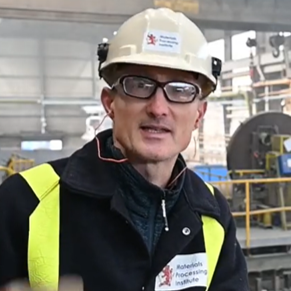Materials Processing Institute innovates to meet global materials challenges sustainably


The Materials Processing Institute is strengthening its innovation strategy to focus on four key areas of innovation that place the Institute at the forefront of work to transform the fields of Advanced Materials, the Circular Economy, Low Carbon Energy and Digital Technologies.
As a result, four new groups made up of scientists and engineers have been created to undertake advanced work in these emerging sectors.
The development of the groups is designed to focus the scientific knowledge and expertise, technical skills and the Institute’s state-of-the-art facilities to overcome the challenges involved in transforming materials, processes and production.
Colin Atkinson has been appointed Manager of the Low Carbon Energy Group and will lead the research, development and deployment of low carbon energy strategies for foundation and energy intensive industries, as well as hydrogen technologies to support the Tees Valley Combined Authority hydrogen strategies.
Peter Warren has been appointed Manager of the Circular Economy Group. The objectives of this group are to recover materials from products at the end of their lives and reprocess them to regenerate raw materials for industry, to create zero waste from industrial processes, and to commercialise techniques that add value to secondary raw materials. This Group also applies industrial knowledge for the recovery of both valuable materials and usable land through industrial land reclamation.
The Advanced Materials Group will draw upon the Institute’s expertise in metallurgy, thermo-fluid dynamics and engineering to produce the new materials needed for future technologies such as autonomous vehicles, electric / hydrogen cars and hyperloop. The focus of this Group is development of materials, then developing, scaling up and proving production routes through to finished materials. It will also look at how existing materials can be improved to increase yields and the quality of materials ranging from steel and metals to glass.
Gerard Stephens, Director Operations, said: “The Institute’s strategy has taken a major step forward with the creation of these dedicated groups that will focus on four areas that will be instrumental in developing the UK’s future industrial policy.
“We are making a significant contribution to reducing industry’s reliance on environmentally damaging and inefficient processes. The Institute possesses a wealth of scientific and technical expertise and is determined to be at the forefront of creating a low carbon economy, supporting a circular economy and developing materials for the technologies to address global challenges.”
The latest announcement follows the launch earlier this summer of a Digital Technologies Group, designed to support organisations embrace the opportunities brought about by the digital revolution. It is supporting the implementation of the current digital revolution, commonly known as Industry 4.0, focusing on the current trend of automation and data exchange in manufacturing technologies and processes. The Group is led by Chris Oswin.
Chris McDonald, the Institute’s Chief Executive, said: “Our aim is to cement our reputation as a globally recognised centre for innovation, development and commercialisation of technology in these four hugely important areas.”
25 October 2019



